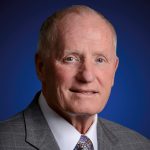Florida property insurance companies, their policyholders, and repair contractors are starting the New Year with a new law designed to reform an out-of-control marketplace. The Florida Legislature in December passed comprehensive measures to stem high insurance and reinsurance rates, carrier insolvencies, inflated claims, excessive litigation, and an overly-competitive residual market.
Former Florida Deputy Insurance Commissioner Lisa Miller talks with Citizens Property Insurance President & CEO Barry Gilway, insurance agency executive Andy McGuire, and reinsurance broker Adam Schwebach about the new law and the expectation it will help rebalance Florida’s decimated property insurance market.

Barry Gilway, President, CEO, and Executive Director, Citizens Property Insurance

Adam Schwebach, Executive Vice President, Gallagher Re

Andy McGuire, Co-CEO, PEAK6 InsurTech
Show Notes
The major provisions of the new law (SB 2-A) cover:
- Attorney Fees: Ends one-way attorney fees in residential and commercial property insurance policy lawsuits;
- Offers of Judgment: Reinstates the civil offer of judgment statute (also known as Proposals for Settlement) and makes attorney fees available for the prevailing party, while also allowing for joint offers of judgment;
- AOBS: Prohibits Assignment of Benefits (AOB) contracts of residential and commercial property insurance policies issued on or after January 1, 2023;
- Bad Faith: Prohibits the filing of a bad faith lawsuit until a final judgement is issued against the insurance company in the original claim dispute;
- Citizens Property Insurance Reforms: Makes many essential improvements to current laws governing the state-backed “insurer of last resort,” Citizens Property Insurance Corporation, including:
- Changing the eligibility to remain a Citizens policyholder, by requiring that private insurance company coverage has to be 20% more expensive (up from 15%, to match current rules on new policies) and likewise for commercial residential policies;
- Ending capped rates (the so-called “glide-path”) and requiring its rates be actuarially-sound and be “non-competitive” with admitted companies’ market rates;
- Defining and allowing higher rates for second (non-homesteaded) homes; and
- Requiring personal lines policyholders purchase flood insurance to become or remain a Citizens policyholder.
- Reinsurance: Establishes a second optional hurricane reinsurance fund (The Florida Optional Reinsurance Assistance Program) for carriers, offering rates of 50% to 65% of the cost of on-line rates, while maintaining the Reinsurance to Assist Policyholders (RAP) program created in the May special session;
- Arbitration: Allows carriers to offer mandatory binding arbitration in their policies with a resulting premium discount;
- Claims Handling: Reduces from 90 days to 60 days the time insurance companies have to pay or deny a claim, unless extended by regulators; and reduce from 14 days to 7 days the time a carrier has to review and acknowledge a claim communication and begin an investigation, along with other time requirement changes;
- Claim Filing: Further tightens deadlines for policyholders to report a claim from 2 years to 1 year for a new or reopened claim, and from 3 years to 18 months for a supplemental claim; and
- Greater OIR Regulation: Allows the Florida Office of Insurance Regulation (OIR) to withdraw approval of policies with an appraisal clause for companies that routinely invoke it; allows OIR to do market conduct exams after a hurricane on those companies in the top 20% of claims filed or DFS complaints and to include an examination of their MGAs; and requires companies begin monthly reporting of the numbers of claims opened, closed, pending, and those seeking alternative dispute resolution and of which type.
You can read a more detailed list of major provisions here of the December 2022 law, built upon previous measures passed in the May 2022 legislative special session. Six Florida insurance companies went insolvent in 2022 and a seventh went into a regulated policy run-off.
Host Miller was joined in the podcast by Barry Gilway, President, CEO, and Executive Director of Citizens Property Insurance; Adam Schwebach, Executive Vice President of reinsurance broker Gallagher Re; and Andy McGuire, Co-CEO of PEAK6 InsurTech, which includes an insurance agency representing more than 100,000 policyholders.
Attorney Fees & AOBs: Gilway, a 46-year veteran of the property insurance industry, called the law “historic,” for repealing the state’s one-way attorney fee statute which he blamed for putting seven insurance companies out of business in 2022, reducing the availability and affordable of insurance for consumers. “From a Citizens Insurance standpoint, our average litigation payment is $77,000 and the attorney fee associated with that payment is $39,000. I’m paying more than 1,000 attorneys to defend the 20,000 outstanding lawsuits we have, brought because there’s an automatic payment under the one-way statute. You have to admit (the new law) is going to make a profound change in whether an attorney brings a suit or not.” According to the Florida Office of Insurance Regulation, Florida has 7% of the nation’s homeowners insurance claims yet 76% of the nation’s homeowners insurance lawsuits.
The new law also eliminates AOBs, which Gilway said are responsible for 47% of all Citizens litigation and 35% of the industry litigation. “These two provisions alone I think will have a profound impact on the industry’s claims going forward,” said Gilway. He predicted this will draw capital back into the marketplace. “The bottom line is more and more calls every single day from investors saying how do I get in, because on a going forward basis, if I can leave the development of losses behind, and I can charge rates that that are based upon historic litigation rates, when the litigation rate is going to drop like a rock, then it’s time for me to enter this marketplace.” Gilway said he believes it will take 12-18 months for the law’s changes to impact the market.
McGuire, whose business includes capital management and consulting, said that although he’s excited and proud of the legislature’s success, he’s still “a little worried,” too. “With the cost of capital where it is right now, I’m still a little bit on the fence to see how things kind of wash through especially on the reinsurance side,” McGuire said, in sentiments echoed by Schwebach, a reinsurance broker for almost 20 years. “There needs to be a period right now of kind of proving out the results of this legislation before reinsurers really get on board,” Schwebach said. Past reforms haven’t shown results in the inflated hurricane claims from Florida’s primary insurance companies still being passed along to reinsurance companies to pay. “Will reinsurance prices come down immediately? I don’t think so. Will reinsurers be more willing to commit capacity to the Florida market? I think there’s a strong possibility,” he added.
Nevertheless, Schwebach said the reinsurance market “thinks that this was a tremendous bill,” with McGuire anticipating many benefits for Florida policyholders. “This is going to unlock the opportunity for rates to be able to come down over time,” said McGuire, who has 150 insurance agents in Florida through the Team Focus Insurance Group and WeInsure, representing 100,000 policyholders. “It’s also going to decrease the dependency of all of our agents on Citizens and really unlock consumer choice.”
Gilway said the new law’s litigation reform does not eliminate a policyholder’s right to sue their insurance company. Allowing proposals for settlement and optional arbitration will allow lawsuits to be resolved more quickly, he said. “I believe it will be a huge advantage that could reduce the average length of a lawsuit from 750 days down to 310 to 320. It’ll cut the length of the suit process in half and it will eliminate the suit process if they accept the arbitration language in the policy,” Gilway pointed out. He said one private company that has used optional arbitration has been able to reduce those policy rates by 20% for certain insurance policies.
Claims Handling & Filing: Host Miller noted that the new law has a lot of changes to the way companies have to respond to claims going forward. McGuire said the requirement for faster claims handling is going to increase costs, something he’s okay with. “I’m actually hopeful that these regulations combined with the elimination of AOBs and one-way attorney fees, that we can actually create a better consumer experience through insurance, and get away from what’s been an almost adversarial claim experience and at the point of sale or at the point of claim create a much better customer experience,” said McGuire, who started his career 27 years ago working insurance claims.
Schwebach agreed, adding that the law’s requirement reducing the claim filing deadline from three years to one year will help, too. “If you don’t understand that you have a claim within a year, it’s probably not a claim,” he said, adding that this is another part of the new law where the reinsurance community is taking note, designed to make sure claims are legitimate and paid accurately and fairly. “At the end of the day, that’s what reinsurers are basing their reinsurance pricing on. They go through a tremendous amount of analysis to try to understand in a hurricane scenario, the estimated loss, down to the policy level. When they’re going back and reviewing that and seeing thousands and hundreds of thousands of dollars of litigation fees being added on to what was in some instances, a very minor actual property loss, and they’re being stuck with the bill for all of that, it throws their analysis out the window,” Schwebach said.
Citizens Property Insurance Reforms: Another big part of the new law makes significant reforms to Citizens Property Insurance, the legislatively created and taxpayer-backed insurer of last resort for homeowners and businesses that can’t find coverage in the private open market. “Citizens is ridiculously competitive. It’s not the market of last resort, it has become the market of first resort,” said Gilway, who has headed Citizens since June 2012 and recently announced his retirement upon the successful changes in the new law that he has long advocated. He said Citizens’ policy count has grown from 414,000 in 2019 to nearly 1.2 million today, in part due to private companies going out of business. “But there’s a secondary issue, and the issue is, in some territories around the state, we’re 50% below the market. So we’re competing openly with the private market. That makes no sense whatsoever,” Gilway said.
The new law changes the eligibility to remain a Citizens policyholder, ends capped rates, requires actuarially-sound and non-competitive rates with the private market, and allows higher rates for second homes – “all good, interim steps to get us back to the role that we were meant to operate in,” said Gilway. He said he hopes the private market will be in a better financial situation to resume depopulating Citizens’ policy count by the end of 2023.
“Who’s going to come in and try to compete with a government entity?” agreed McGuire. “Why would you commit capital to that? Florida has now solved both of those and being able to talk to consumers about that is really, really important. And that’s how this market is going to change.” McGuire said setting expectations that rates aren’t going to go down immediately is part of that. “This is not a little speedboat here that we can just turn. This is a big aircraft carrier and it’s going to take a little bit to get there, but we’re going to get there,” he said.
Reinsurance Help: Schwebach shared his insight on the Florida Optional Reinsurance Assistance Program created under the new law, to help insurance companies that cannot find affordable reinsurance in the private market. “I think the jury to a certain extent is very much out on how effective this reinsurance offering is going to be from the state,” he said. And while the market is appreciative of the effort, “I think they are trying to determine if there’s true value in what’s being offered, the capacity being provided relative to the price,” Schwebach said. He also discussed the important role reinsurance plays in the Florida insurance market and how consumers benefit from its availability.
Host Miller stressed that the new law should mark a new beginning among consumers, agents, insurance companies, contractors, investors, reinsurers, legislators, and Realtors. “This should be a collaboration to get away from the nasty litigation and the adversarial relationships that we’ve seen over the past few years so that we can restore this market so that it will be vibrant for our consumers and very competitive,” said Miller.
Links and Resources Mentioned in this Episode
Citizens Property Insurance Corporation
Key Provisions of 2022 Insurance Consumer Protections & Market Reforms (SB 2-D & SB 2-A)
Reinsurance to Assist Policyholders (RAP) Program
Florida Optional Reinsurance Assistance (FORA) Program
Property Insurance Stability Report (Florida Office of Insurance Regulation, July 2022)
2022 Litigation Reform & Consumer Protections (Lisa Miller & Associates)
Florida Market ‘Plagued’ by Attorney Fee-Shifting (LMA Newsletter of December 5, 2022)
** The Listener Call-In Line for your recorded questions and comments to air in future episodes is 850-388-8002 or you may send email to [email protected] **
The Florida Insurance Roundup from Lisa Miller & Associates, brings you the latest developments in Property & Casualty, Healthcare, Workers’ Compensation, and Surplus Lines insurance from around the Sunshine State. Based in the state capital of Tallahassee, Lisa Miller & Associates provides its clients with focused, intelligent, and cost conscious solutions to their business development, government consulting, and public relations needs. On the web at www.LisaMillerAssociates.com or call 850-222-1041. Your questions, comments, and suggestions are welcome! Date of Recording 12/28/2022. Email via [email protected] Composer: www.TeleDirections.com © Copyright 2017-2022 Lisa Miller & Associates, All Rights Reserved

